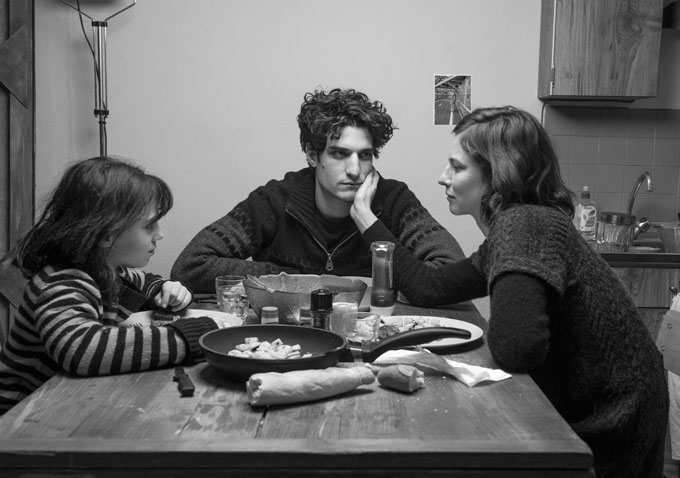 With its black-and-white cinematography and casting of his son as the lead, Philippe Garrel’s “Jealousy” (“La Jealousie”) feels remarkably personal and intimate. But that’s as it should be, given that Philippe Garrel based the script on his own father’s relationships. Louis Garrel stars as Louis, a man who leaves his wife (Rebecca Covenant) and young daughter Charlotte (Olga Milshtein) in the film’s first few minutes. He moves in with girlfriend Claudia (Anna Mouglalis) to a small apartment, where unhappiness soon begins to brew. He and Claudia are each tempted by others outside their relationship, while his ex-wife Clothilde grows more jealous of Claudia, not only for her relationship with her ex, but also with her own daughter. Charlotte is one of the film’s few empathetic characters, reminding us a little of the French, contemporary equivalent of the fantastic Quinn Cummings in “The Goodbye Girl” in her precociousness and self possession. As Louis struggles in most of his relationships, he continues to connect with his daughter, moving past the stereotype of the post-divorce absentee father. It’s in this relationship that he’s at his most human.
With its black-and-white cinematography and casting of his son as the lead, Philippe Garrel’s “Jealousy” (“La Jealousie”) feels remarkably personal and intimate. But that’s as it should be, given that Philippe Garrel based the script on his own father’s relationships. Louis Garrel stars as Louis, a man who leaves his wife (Rebecca Covenant) and young daughter Charlotte (Olga Milshtein) in the film’s first few minutes. He moves in with girlfriend Claudia (Anna Mouglalis) to a small apartment, where unhappiness soon begins to brew. He and Claudia are each tempted by others outside their relationship, while his ex-wife Clothilde grows more jealous of Claudia, not only for her relationship with her ex, but also with her own daughter. Charlotte is one of the film’s few empathetic characters, reminding us a little of the French, contemporary equivalent of the fantastic Quinn Cummings in “The Goodbye Girl” in her precociousness and self possession. As Louis struggles in most of his relationships, he continues to connect with his daughter, moving past the stereotype of the post-divorce absentee father. It’s in this relationship that he’s at his most human.
 The elder Garrel’s film is made up of small moments; hands illicitly touch in the dark of a movie theater, and a dinner party’s awkwardness is revealed through a wide shot of a long table of diners. There are also more traditionally epic scenes of the relationships and lives here, particularly in a jarring climactic sequence, however, Garrel and cinematographer Willy Kurant focus more on the small gestures and conversations that lead to the breakdown of those relationships. And these scenes are perfectly shot, capturing the texture of the hands or a couples’ silence in comparison to their fellow diners’ chatter. Kurant’s experience is literally all over the map, ranging from “Masculin Féminin” to “Pootie Tang,” but he has created a beautiful aesthetic with Garrel here.
The elder Garrel’s film is made up of small moments; hands illicitly touch in the dark of a movie theater, and a dinner party’s awkwardness is revealed through a wide shot of a long table of diners. There are also more traditionally epic scenes of the relationships and lives here, particularly in a jarring climactic sequence, however, Garrel and cinematographer Willy Kurant focus more on the small gestures and conversations that lead to the breakdown of those relationships. And these scenes are perfectly shot, capturing the texture of the hands or a couples’ silence in comparison to their fellow diners’ chatter. Kurant’s experience is literally all over the map, ranging from “Masculin Féminin” to “Pootie Tang,” but he has created a beautiful aesthetic with Garrel here.
 While we enjoyed the look and feel of “Jealousy,” we found our patience with Louis and Claudia’s characters growing thin as the film continued. Louis and Claudia obsess over their partner’s fidelity, while ignoring their own, taking part in behavior that seems illogical, given their theoretical interest in building a life together. All this said, Garrel does a fine job, evoking both the look and the themes of the French New Wave in “Jealousy.” Louis and Claudia’s crisis relates to their dual careers as actors, and the little income that affords them. They’d have to forgo their Bohemian lifestyle for more comfort and stability, and this friction adds to the push and pull within their relationship.
While we enjoyed the look and feel of “Jealousy,” we found our patience with Louis and Claudia’s characters growing thin as the film continued. Louis and Claudia obsess over their partner’s fidelity, while ignoring their own, taking part in behavior that seems illogical, given their theoretical interest in building a life together. All this said, Garrel does a fine job, evoking both the look and the themes of the French New Wave in “Jealousy.” Louis and Claudia’s crisis relates to their dual careers as actors, and the little income that affords them. They’d have to forgo their Bohemian lifestyle for more comfort and stability, and this friction adds to the push and pull within their relationship.
Short and anything but sweet, “Jealousy” is a good entry point to Garrel’s filmography, for those new to the director’s work. Though he’s been making films since the ‘60s, he’s achieved less acclaim stateside than some of his fellow post-French New Wave directors, only recently breaking through with films like “Regular Lovers.” While it features characters making unrelatable decisions, this 77-minute film is nonetheless compelling and beautifully constructed, and will be of particular interest for fans of French cinema. [B]

